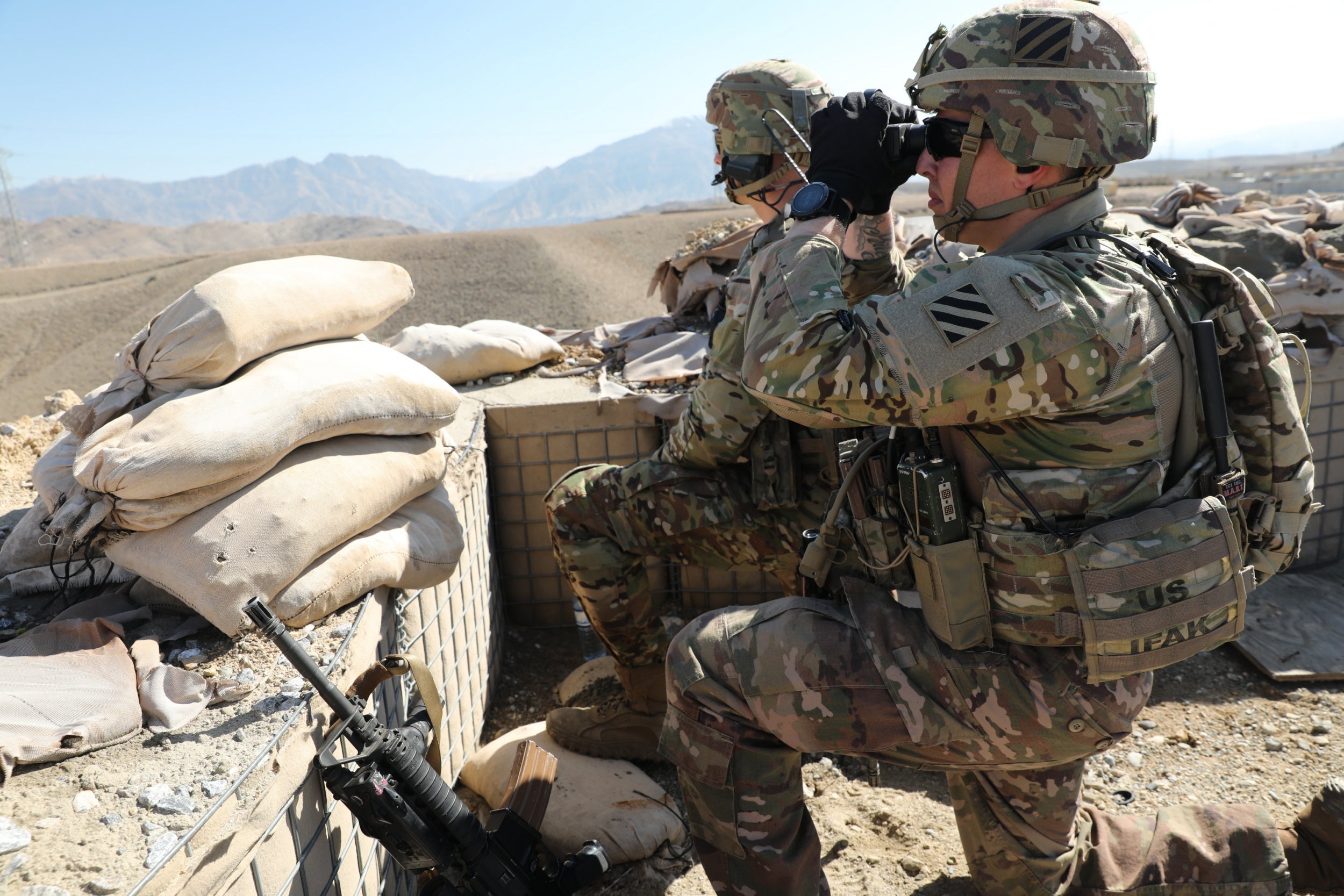US politicians agree on pulling troops out of Afghanistan – but how can they do it and at what risk?
With Donald Trump's planned talks with the Taliban collapsing, and following the latest Democratic debate, all sides seem to agree on the need to end America's longest war. But the options for doing so come at a cost, writes Negar Mortazavi


Your support helps us to tell the story
From reproductive rights to climate change to Big Tech, The Independent is on the ground when the story is developing. Whether it's investigating the financials of Elon Musk's pro-Trump PAC or producing our latest documentary, 'The A Word', which shines a light on the American women fighting for reproductive rights, we know how important it is to parse out the facts from the messaging.
At such a critical moment in US history, we need reporters on the ground. Your donation allows us to keep sending journalists to speak to both sides of the story.
The Independent is trusted by Americans across the entire political spectrum. And unlike many other quality news outlets, we choose not to lock Americans out of our reporting and analysis with paywalls. We believe quality journalism should be available to everyone, paid for by those who can afford it.
Your support makes all the difference.It’s been a week since Donald Trump suddenly cancelled secret talks with the Taliban, after the Afghan group took responsibility for a deadly car bombing in Kabul.
Mr Trump’s unprecedented negotiations with the Taliban were aimed at ending America’s longest war and bringing US troops home. It’s something the American people have been expecting for a while and both Mr Trump and his predecessor, Barack Obama, have promised to get done, without success. But disagreements remain on how a withdrawal should happen.
The number of US troops in Afghanistan today – around 14,000 – is higher than when Mr Trump entered the White House in 2017. The peace deal with the Taliban was expected to see 5,500 troops withdrawn within five months.
Ending America’s long and costly war is one of the few areas where Democratic candidates agree with the president. The third Democratic debate this week included a discussion on Afghanistan with candidates called on to explain their vision of how to end it.
Senator Elizabeth Warren, one of the leading Democratic contenders, said US withdrawal should start “today” even without a deal with the Taliban. Ms Warren who belongs to the progressive wing of the Democratic party, said what the US is doing in Afghanistan is not helping the safety and security of the United States, Afghanistan or the world. She added that the US military cannot solve the problem of terrorism across the world.
Senator Bernie Sanders, one of the most progressive US politicians and a consistent critic of successive administrations’ foreign policy, boasted that he had been the only person on stage to have voted against “all three of Trump’s military budgets”. He said: “We don’t have to spend $750bn [£600bn] on the military when we don’t even know who our enemy is.”
However, critics of an immediate withdrawal of troops from Afghanistan, including senior military officials, believe that ending the long war must be done carefully to ensure that the country does not once again become a safe haven for terrorist groups and future attacks.
General Joseph Dunford, chair of the Joint Chiefs of Staff, has recently warned against withdrawal from Afghanistan as he believes the country still needs support to deal with increased levels of violence. General Dunford has said that the US needs to bring peace and stability to Afghanistan and make sure that the country is not a “sanctuary”.
The Afghanistan war began after Al-Qaeda operatives crashed planes into the World Trade Centre in New York, into the Pentagon and into a field in Pennsylvania on 11 September, 2001, killing nearly 3,000 people. Afghanistan was a base for al-Qaeda and one of the countries where the attacks had been planned, although none of the 19 attackers were Afghans. President George W Bush launched the “war on terror”, which led to the invasion of Afghanistan and later Iraq.
During the debate the Democratic frontrunner and former vice president Joe Biden said the US does not need troops on the ground in Afghanistan and suggested that Pakistan can provide bases for US forces to ensure Afghanistan does not become a terrorist haven.
Another candidate for the nomination, Pete Buttigieg, the mayor of South Bend, Indiana, and a veteran who served under General Dunford in Afghanistan, also agreed that the US must put an end to an apparently endless war in a way that ensures Afghanistan is never again used for an attack against the US, but said that it did not require an open-ended commitment of ground troops.
Critics of President Trump believe that negotiating with the Taliban alone can not provide a sustainable solution for Afghanistan.
Ali Soufan, a former FBI special agent who investigated international terrorism cases and is a member of the Homeland Security Advisory Council, says a peace deal must include not only the Taliban, but also the Afghan government and all other political factions in the country. He told The Independent: “At the table we must include the concerns of the democratically elected government, ethnic and religious minorities, women, the security forces, and so on.”
Referring to the chaos of the US withdrawal from Vietnam in the mid-1970s following another protracted foreign war, he added that “to simply just leave could result in another Saigon. We cannot ignore our friends and we cannot ignore the violent fate that would befall them, including from terrorist groups, if we get this wrong.”
Nearly 200,000 people have been killed in Afghanistan and Pakistan since 2001, more than 60,000 of them civilians, Brown University estimates. These figures do not include deaths from malnutrition, damaged health systems and environment.
So far nearly 7,000 American and over 600 British service personnel have died in the war zones of Iraq, Afghanistan and Pakistan, in addition to thousands of local military and police deaths. Britain has around 1,000 troops still in Afghanistan.
John Glaser, foreign policy director at the libertarian Cato Institute in Washington, says the argument that the war must continue in order to protect the United States from terrorists is “absurd”.
He told The Independent: “There is zero evidence – zero – that ‘fighting them over there’ has stopped us having to ‘fight them over here’. The idea that a ‘safe haven’ in Afghanistan will somehow enable al-Qaeda or some other group to launch transnational attacks into US soil is largely a myth.
“Having territory in remote, landlocked Afghanistan just isn’t much help to terrorist groups trying to attack the US, and not one of the jihadi-inspired attacks on US soil since 9/11 was committed by someone with operational ties to terrorist groups within any safe haven abroad.”
Beyond the human cost, the total US spending for the war in Afghanistan has been approximately $2 trillion so far, according to Brown University. In addition to the federal costs, millions of dollars have been spent by state, municipal, and private entities on services for returning veterans and their families.
Join our commenting forum
Join thought-provoking conversations, follow other Independent readers and see their replies
Comments